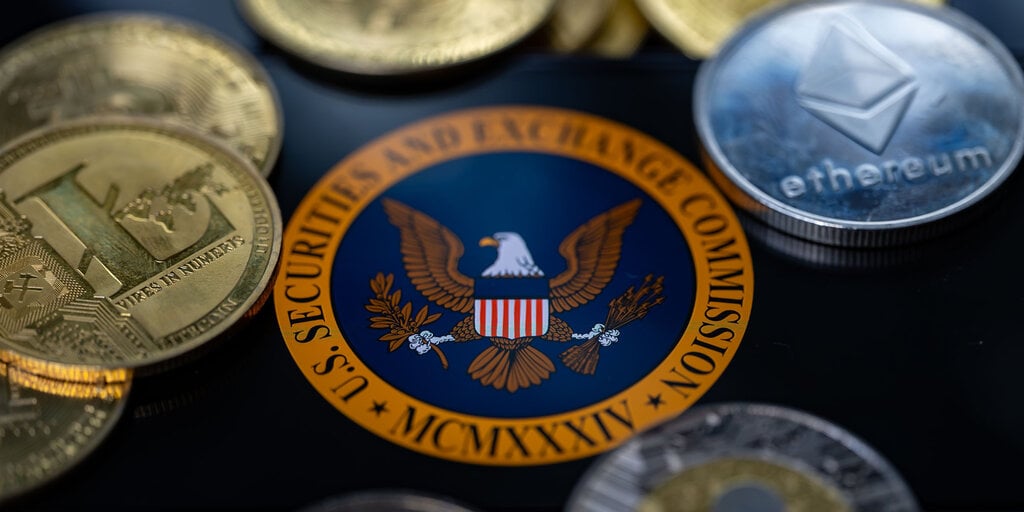In brief
Lawmakers need a two-thirds majority to override President Biden’s veto of a repeal of SAB 121—which would finally allow American banks to hold crypto.
Crypto lobbyists aren’t assured that this week’s vote will surpass that high bar.
But pressure on Democrats from former president Trump’s recent embrace of the industry, and the unfolding crisis of legitimacy currently plaguing Biden’s campaign, could push the bill over the finish line.
Weeks after President Joe Biden vetoed a bill passed by both chambers of Congress that would finally allow American banks to hold crypto assets, the legislation is back on Capitol Hill—where lawmakers hope to pass it once again, this time with a veto-proof supermajority.
If both the House and the Senate were to pass the bill—a repeal of the Staff Accounting Bulletin No. 121 (aka SAB 121) rule of the U.S. Securities and Exchange Commission (SEC)—the achievement would have massive implications for the U.S. banking industry.
It would also send an unmistakable message to the White House that America’s fractured political system can finally agree on one thing: that the Biden Administration’s crypto policy is profoundly unpopular. Further, the two-thirds vote now required to overrule Biden’s veto would require significant Democratic defections, at a time when the president is desperately attempting to suffocate growing calls from within his own party to abandon his struggling bid for re-election.
Crypto policy experts in Washington who spoke with Decrypt said that while SAB 121 faces steep odds this week of veto-proof passage through the House, several factors might help get it over the finish line.
“We’re pushing out communications, and we’re hopeful that it’s within reach—but I think it is a pretty high hurdle,” Kristin Smith, CEO of the Blockchain Association, a DC-based crypto lobbying group, told Decrypt.
She added, however, that several factors lead her to believe passage is possible. For one, the initial repeal of SAB 121—and the subsequent passage in the House of a crypto regulatory framework, FIT 21—both caught the industry by total surprise. Ultimately, 71 House Democrats split with Biden to approve the latter bill, a number that on the right day in the chamber could constitute a supermajority.
What’s more, the vote comes at an unprecedented moment in modern American politics, when Democratic lawmakers are struggling to express discontent at Biden’s increasingly unpopular candidacy without throwing their party into open revolt.
Smith says this week’s SAB 121 vote could provide Democrats a subtle—but unmistakable— avenue to signal their lack of blind fealty to Biden.
“This would be an opportunity to show independent thinking, compared to where the White House has been,” Smith said.
Repealing SAB 121 would not just signal abstract opposition to Biden’s crypto policies. It would tangibly reshape the American economy by allowing traditional banks to hold crypto assets—something the SEC has forbidden.
The ability for American banks to act as crypto custodians became increasingly urgent this year, after the SEC approved spot Bitcoin ETFs and spot Ethereum ETFs to trade on Wall Street. Those financial products require real Bitcoin and Ethereum to be held by a third-party. But since traditional American banks are barred from acting as crypto custodians, exchanges like Coinbase control the overwhelming majority of assets associated with such spot ETFs.
That monopoly has come increasingly under scrutiny in Washington. On Tuesday, Rep. Wiley Nickel, a Democrat from North Carolina, expressed concern about the “concentration risk” created by “misguided” crypto policies like the SEC’s SAB 121 during a meeting of the Financial Services Committee.
“We have the best banks in the world,” Nickel said. “They ought to be able to take care of this custodial banking piece.”
Other crypto lobbyists have heard rumors on Capitol Hill, however, that the surprisingly strong support of crypto-related bills among Democrats in Congress last month might constitute more of a ceiling for future votes, rather than a floor.
“There’s some view that the Senate Democrats who voted for [repealing SAB 121] were checking a crypto box,” Kris Klaich, Policy Director for crypto lobbying group the Chamber of Digital Commerce, told Decrypt. “[It was] their one chance to say they did something to support crypto where it would have no consequences, because they knew the President would veto it.”
But Democrats’ calculus on crypto has grown ever more complicated since former president Donald Trump began overtly courting the industry in recent months. On Monday, Republicans passed a draft party platform that explicitly embraced crypto, a first for a major American political party.
In light of those more aggressive moves, Democrats may feel a newfound pressure to signal that they are not enemies of innovation and technological progress, Klaich added.
“There’s also a view potentially that because Trump came out in favor of crypto, that may have changed the dynamic and put some more fuel on the fire to push Democrats along this [pro-crypto] path,” he said.
In that sense, Republicans might have their Democratic colleagues exactly where they want them.
“This vote will reveal your elected officials’ true stance on crypto,” Republican Senator Bill Hagerty of Tennessee said Tuesday afternoon, of the upcoming SAB 121 repeal vote. “The last vote was pre-determined given Biden’s veto threat—this time it is live.”
“Pro-innovation Republicans have made our stance clear,” he added. “Will Democrats have the courage to join us?”
Edited by Andrew Hayward
Daily Debrief Newsletter
Start every day with the top news stories right now, plus original features, a podcast, videos and more.
Source: https://decrypt.co/239127/will-democrats-defy-biden-pass-pro-crypto-sab-121-again



